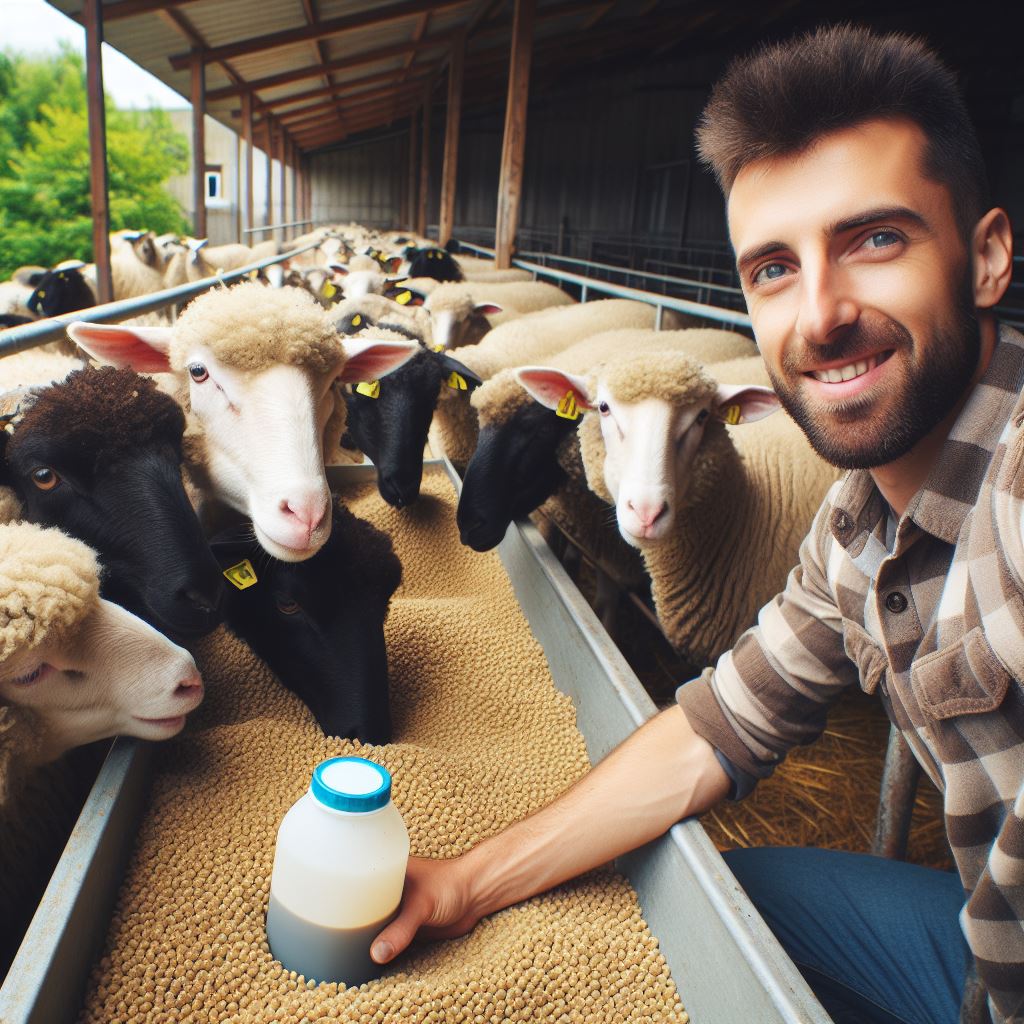Sheep Feeding 101: Nutrition for Flock Health
Last Updated on January 24, 2024
Introduction
Let’s Explore Sheep Feeding 101: Nutrition for Flock Health
In the realm of successful sheep farming, proper nutrition is paramount for ensuring flock health and productivity.
This section explores the critical role of nutrition in sheep farming and provides an insightful overview of the topic in “Sheep Feeding 101.”
Highlighting the importance of nutrition, we delve into how it directly influences the overall well-being of the flock.
With a focus on Sheep Feeding 101, this introduction sets the stage for a comprehensive exploration of essential nutritional aspects.
This section aims to equip sheep farmers with a foundational understanding of feeding practices, emphasizing the pivotal role nutrition plays in maintaining healthy and thriving flocks.
As we embark on this journey, we’ll uncover key insights and practical tips for optimizing sheep nutrition to promote robust flock health.
Basic Nutritional Needs of Sheep
Sheep, like all living creatures, have specific nutritional requirements that are necessary for their overall health and well-being.
It is essential for sheep farmers and shepherds to have a good understanding of these basic nutritional needs in order to provide proper sheep feeding and ensure a healthy flock.
Essential nutrients required by sheep
- Energy: Sheep need energy to fuel their day-to-day activities and bodily functions. Energy is primarily obtained from the carbohydrates in their diet, such as grains and forages.
- Protein: Protein is crucial for muscle development, growth, and repair in sheep. It is obtained from sources like legumes, soybean meal, and other high-quality feedstuffs.
- Vitamins: Sheep require a variety of vitamins for various metabolic processes in their bodies. Vitamins A, D, and E are especially important for proper growth, reproduction, and overall health.
- Minerals: Minerals play a vital role in maintaining bone health, fluid balance, and bodily functions in sheep. Essential minerals include calcium, phosphorus, magnesium, and sodium.
Understanding the role of each nutrient
- Energy for growth and maintenance: Energy-rich carbohydrates provide the necessary fuel for sheep to grow, develop, and maintain their daily activities. It is important to provide an adequate amount of energy in their diet to support their overall health.
- Protein for muscle development and repair: Protein is essential for the growth, development, and repair of muscles in sheep. It helps them build strong and healthy muscles, especially in young lambs and pregnant ewes.
- Vitamins for various metabolic processes: Vitamins are essential for proper metabolic functions in sheep. Vitamin A is important for vision, reproduction, and immunity. Vitamin D aids in calcium and phosphorus absorption, while vitamin E acts as an antioxidant and supports the immune system.
- Minerals for bone health and bodily functions: Minerals are necessary for maintaining healthy bones, regulating fluid balance, and supporting various bodily functions in sheep. Adequate levels of calcium and phosphorus are crucial for bone development and maintenance, especially in growing lambs.
Therefore, understanding the basic nutritional needs of sheep is vital for their overall health and productivity.
Farmers and shepherds should ensure that their flock receives a balanced diet that provides the necessary energy, protein, vitamins, and minerals.
By meeting these nutritional requirements, sheep can thrive and have a better chance of remaining healthy and productive throughout their lives.
Read: Top Tech in Modern Cattle Farming
Types of Feed for Sheep
Proper nutrition is essential for maintaining the health and productivity of a sheep flock.
While grazing on pasture is a natural way for sheep to fulfill their nutritional needs, supplementary feeding options can play a crucial role in optimizing their diet.
In this section, we will explore the different types of feed available for sheep, including the benefits of pasture feeding and various supplementary feeding options.
Grazing on pasture
Grazing on pasture is the primary feeding method for sheep and offers several benefits.
Pasture feeding allows sheep to consume a variety of grasses and legumes, which provide essential nutrients, vitamins, and minerals.
Additionally, grazing on pasture also encourages natural foraging behavior, which promotes dental health and reduces the risk of digestive disorders.
When considering pasture for sheep, it is important to choose suitable grasses and legumes.
Popular grasses for sheep include ryegrass, Timothy grass, and Kentucky bluegrass.
These grasses are highly palatable and contain a good balance of nutrients.
Legumes like clover, alfalfa, and trefoil are also excellent choices, as they are rich in protein and energy.
Supplementary feeding options
In addition to grazing on pasture, supplementary feeding can be beneficial for sheep, especially during certain periods or when pasture availability is limited.
The following are some common supplementary feeding options:
- Hay and silage: These are dried or fermented forages that retain the nutritional value of the original plants. They can provide fiber and energy to sheep when fresh pasture is insufficient.
- Concentrate feeds: These feeds include grains, such as corn and barley, and formulated pellets or mixes. Concentrate feeds are rich in protein and energy, making them ideal for improving growth rates and meeting specific nutritional requirements.
- Feed additives and supplements: Adding additives or supplements to sheep feed can enhance its nutritional value. Examples include minerals, vitamins, probiotics, and growth promoters. These additives can address specific deficiencies or promote overall flock health.
When selecting supplementary feed options, it is crucial to consider the nutritional needs of the sheep, their stage of production (e.g., gestation, lactation), and the availability and cost of feed.
It is recommended to consult with a livestock nutritionist or veterinarian to determine the appropriate types and quantities of supplementary feeds suitable for your flock.
Most importantly, understanding the different types of feed for sheep is essential for maintaining their overall health and well-being.
Grazing on pasture provides numerous benefits, while supplementary feeding options can address specific nutritional requirements.
By providing a balanced diet that combines natural grazing with suitable supplementary feeds, you can ensure the optimal nutrition and productivity of your sheep flock.
Read: Effective Breeding Strategies for Beef
Feeding Strategies for Different Sheep Stages
Feeding strategies play a crucial role in ensuring the health and well-being of sheep.
Each stage of a sheep’s life requires specific nutritional considerations to support their growth and development effectively.
In this section, we will explore feeding strategies for different sheep stages – feeding lambs, feeding pregnant ewes, and feeding lactating ewes.
Feeding Lambs
When it comes to feeding lambs, several key factors need to be considered to promote their healthy growth.
Firstly, providing colostrum and milk replacers is crucial in the initial stage of a lamb’s life.
Colostrum is rich in essential nutrients and provides important antibodies that boost the lamb’s immune system.
As the lambs grow, they need to transition from milk to solid feed. This process should be gradual, allowing their digestive system to adjust to the change.
Introducing small amounts of solid feed and increasing it gradually over time will ensure a smooth transition.
Finally, a proper weaning process is vital to separate the lambs from their mothers effectively.
This process should occur gradually to prevent stress and ensure the lambs are consuming enough solid feed to support their growth.
Feeding Pregnant Ewes
Pregnant ewes have specific nutritional requirements during the gestation period.
Providing a well-balanced diet that meets these requirements is essential for the health of both the ewe and her offspring.
Adequate nutrition during gestation helps prevent complications and promotes proper fetal development.
In addition to meeting nutritional requirements, it is crucial to monitor the body condition score of pregnant ewes.
Maintaining an optimal body condition ensures that the ewe has enough energy reserves to support her pregnancy and ensures a successful lambing process.
Feeding Lactating Ewes
Lactating ewes have increased energy and protein needs due to milk production.
It is important to provide them with a diet that meets these requirements to support optimal milk production for their lambs.
Ensuring proper nutrition for lactating ewes directly influences the growth and health of the lambs.
Meeting the energy and protein needs of lactating ewes through a well-balanced diet will contribute to sufficient milk production.
Adequate milk supply is essential for the lambs to thrive and reach their developmental milestones.
This stage requires a focus on both the ewe and lamb’s nutrition to ensure overall flock health.
Feeding strategies tailored to each stage of a sheep’s life are necessary to maintain the health and productivity of the flock.
Proper nutrition during crucial stages such as lambing, gestation, and lactation ensures the overall well-being of both the ewes and their offspring.
Implementing the recommended feeding strategies will contribute to the success and profitability of any sheep farming operation.
Read: Cattle Welfare: Ensuring Healthy Lives

Monitoring and Adjusting Feeding Programs
Feeding sheep requires careful monitoring and adjusting of feeding programs to ensure flock health and productivity.
This section discusses two important aspects of monitoring and adjusting feeding programs: evaluating body condition scores and conducting feed analyses.
Evaluating body condition scores
Regular assessment of body condition scores is a crucial tool for sheep farmers.
Body condition scoring helps determine the nutritional status of individual sheep and the entire flock.
It involves visual and tactile evaluation to assess the amount of body fat and muscle in the animal.
Benefits of regular assessment
Evaluating body condition scores benefits flock health in several ways. Firstly, it enables farmers to identify sheep that may be underfed or overfed.
This information helps in adjusting feeding programs to prevent nutritional deficiencies or excesses.
Secondly, monitoring body condition allows farmers to identify potential health issues early on and intervene promptly.
Signs of under or overfeeding
When evaluating body condition scores, farmers should be aware of signs indicating under or overfeeding.
Sheep with a body condition score below the desired range may exhibit weight loss, poor coat quality, and reduced milk production in ewes.
On the other hand, sheep with a score above the ideal range may show signs of obesity, such as difficulty moving or lambing problems.
Conducting feed analyses
Testing feed quality and composition is essential to ensure that the flock receives the necessary nutrients for optimal growth and health.
Conducting feed analyses involves assessing the nutrient content, digestibility, and potential contaminants in the feed.
Testing feed quality and composition
Various factors affect feed quality, including the type of forage, storage conditions, and any additives used. Farmers can send samples of their feed to a laboratory for analysis.
This helps determine the nutrient content, such as protein, carbohydrates, and minerals, as well as detect any potential toxins or harmful substances.
Adjusting rations based on results
Once the feed analysis results are obtained, farmers can adjust the rations accordingly.
For example, if the analysis reveals low protein content, farmers can supplement the feed with protein-rich supplements.
The analysis also helps in balancing the proportions of different nutrients in the ration to meet the specific needs of the flock.
Most importantly, monitoring and adjusting feeding programs are crucial for maintaining the health and productivity of a sheep flock.
Regular evaluation of body condition scores allows farmers to identify under or overfeeding and intervene accordingly.
Conducting feed analyses ensures that the flock receives high-quality nutrition and enables farmers to adjust rations based on the results.
By actively monitoring and adjusting feeding programs, sheep farmers can optimize flock health and performance.
Read: Beef Cattle Nutrition: What Works Best?
Common Sheep Feeding Issues and Solutions
Feeding sheep is not just about providing them with food; it’s about ensuring the right balance of nutrition to promote flock health.
However, like any livestock, sheep can face various feeding issues that can impact their overall well-being.
In this section, we will discuss common sheep feeding issues and their appropriate solutions.
Nutritional Imbalances and Deficiencies
One common feeding issue in sheep is nutritional imbalances and deficiencies.
It is essential to identify the signs and symptoms of these problems early on to prevent any adverse effects on the flock’s health.
Some signs of nutritional imbalances and deficiencies in sheep include poor growth, weight loss, weak immune system, and poor reproductive performance.
If you notice any of these signs, it is crucial to take immediate action.
Appropriate supplementation or diet changes are often necessary to correct these imbalances and deficiencies.
Consult with a veterinarian or a livestock nutritionist to determine the specific nutrients that may be lacking in the sheep’s diet.
They can recommend suitable supplements or adjust the ration accordingly.
Overfeeding and Obesity
Another feeding issue that sheep owners need to address is overfeeding, which can lead to obesity in the flock.
Overfeeding poses several health risks for sheep, and it’s essential to address this issue promptly.
When sheep are overfed, they consume more calories than they can burn, resulting in excess weight gain.
This can lead to obesity, which increases the risk of various health complications, including metabolic disorders, joint problems, and reduced fertility.
Implementing portion control is crucial in preventing overfeeding.
Divide the sheep’s daily ration into smaller meals throughout the day instead of providing all the food at once.
This helps regulate their calorie intake and prevents excessive feeding.
In addition to portion control, it may be necessary to adjust the sheep’s diet.
Reduce the energy-dense feeds and increase the fiber content to promote weight management.
Consult with a livestock nutritionist to develop a balanced diet plan that meets the sheep’s nutritional requirements without causing excessive weight gain.
In short, sheep feeding issues such as nutritional imbalances, deficiencies, overfeeding, and obesity can significantly impact flock health.
Identifying the signs, supplementing appropriately, implementing portion control, and adjusting the diet can help address these issues and ensure the overall well-being of the sheep.
Conclusion
Recap of key points discussed
Throughout this blog post, we have covered important aspects of sheep feeding and nutrition.
We learned about the different types of forage and concentrates that should be included in a well-balanced diet for sheep.
We also discussed the importance of providing adequate amounts of water, vitamins, and minerals to support the overall health and well-being of the flock.
Furthermore, we highlighted the significance of considering the specific nutritional needs of different sheep breeds and age groups, as well as the importance of regular monitoring and adjusting the diet as needed.
Importance of proper sheep nutrition for flock health and productivity
Proper nutrition is essential for maintaining the health and productivity of the sheep flock.
A well-balanced diet ensures that the sheep receive the necessary nutrients to support growth, reproduction, and overall body functions.
By providing the right nutrition, we can prevent deficiencies and health issues that could affect the well-being and productivity of the flock.
Proper nutrition not only improves the immune system of the sheep but also enhances their wool quality and meat production.
Investing in proper sheep nutrition leads to a healthier and more profitable flock for farmers, ensuring long-term success and sustainability in the sheep farming industry.


